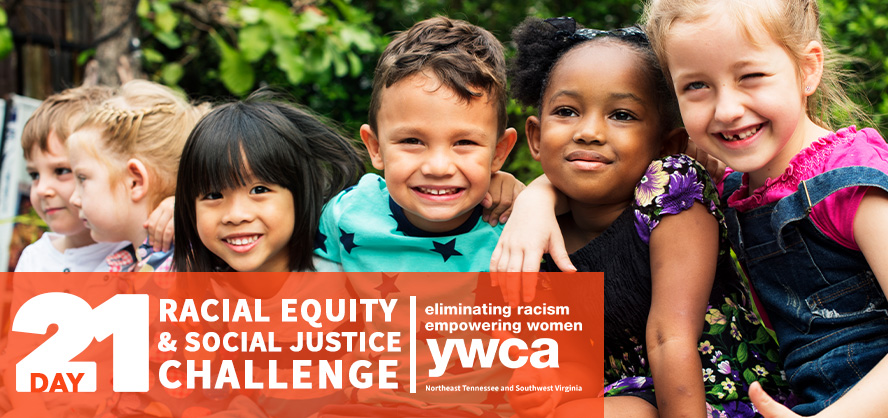21 Day Challenge

WEEK 4: VOTING
Welcome to the fourth week of the 21 Day Racial Equity and social justice challenge. Today we will begin with Racism and The Women’s Suffrage and move into voter suppression, the importance of the census count and look into Anti-Racist verses Non-Racist.
DAY 16: RACISM AND THE WOMEN’s SUFFRAGE
The fight for women’s suffrage was not as straightforward as you might think. Today we will examine the intersections of race and gender and how this played out during the fight for the 19th Amendment. Black women were marginalized in the movement and their contributions sidelined by history. Today, we will look back at these pioneering leaders and how they laid the groundwork for universal suffrage and the civil rights movement.
Read this article about the African American suffragists who fought for the right to vote, while fighting racist backlash from the movements white leadership, many of whom did not believe that any black person should have the right to vote before white women. https://www.womenshistory.org/articles/votes-women-means-votes-black-women
Read about five amazing women of color who bravely fought for the abolition of slavery, the rights of women, and civil rights in the United States. They pioneered the idea of intersectionality more than a century before the term would be officially coined in 1989. https://nmaahc.si.edu/blog-post/5-you-should-know-african-american-suffragists
DAY 17: HISTORY OF VOTER SUPPRESSION
Today, we are looking at the history of voter suppression and how people of color were systemically kept from the ballot box, as well as the challenges they had to overcome in order to exercise their right to vote. Today’s activities will provide much-needed context for tomorrow’s challenge, which will show how voter suppression has changed over time and how it is disenfranchising marginalized communities today.
1890-1960’s Voter Literacy Tests were designed to disenfranchise people of color from voting (white men were exempt). Print out and try to complete this test. Be sure to set a timer before you start, you would have been given 10 minutes to finish. https://allthatsinteresting.com/voting-literacy-test
View this interactive timeline of the history of the Voting Rights Act and see how access to the vote has been expanded and restricted over time. https://www.aclu.org/issues/voting-rights/voting-rights-act/history-voting-rights-act
DAY 18: VOTER SUPPRESSION TODAY
Yesterday you learned about voter suppression and its impact on American history and people of color. Today, we are going to learn how voter suppression continues to impact our democracy and disenfranchise marginalized groups. With 2020 being a significant election year, it is important that we recognize the barriers to voting that many people still face and work to eliminate those barriers, so that our representatives and laws reflect our increasingly diverse country.
Read this article and see how the fight for universal suffrage began and how modern voter suppression tactics continue to deny the vote to people of color. https://newrepublic.com/article/151858/americas-relentless-suppression-black-voters
Read about how Tennessee’s disenfranchisement laws are among the most complicated and onerous in the country. Tennessee prevents people from voting if they have been convicted of a felony and are incarcerated, on parole or probation, owe court fines and fees, owe restitution, or are not current in child support payments.
DAY 19: THE U.S. CENSUS
Every 10 years the federal government undertakes the important task of counting every person living in the United States. Today, you are going to learn about the Census’ history, why people of color are routinely undercounted, and how this unsung program impacts the lives of every American without most of us even realizing it. Before you begin, review the maps of Tennessee and Virginia in the 2021 Census and make a note of any observations you have.
TN: https://worldpopulationreview.com/states/tennessee-population
VA: https://worldpopulationreview.com/states/virginia-population
https://www.theguardian.com/us-news/datablog/2020/feb/27/2020-us-census-black-people-mistakes-count
https://covidtracking.com/race
Listen to YWCA USA’s Organize Your Butterflies podcast about their YWomenCount campaign to encourage everyone to participate in the 2020 census. https://ywomencount.org/resources/we-all-count-census-2020/
DAY 20: HOW TO BE AN ANTI-RACIST
"Anti-racism is the active process of identifying and eliminating racism by changing systems, organizational structures, policies and practices and attitudes, so that power is redistributed and shared equitably." - NAC International Perspectives: Women and Global Solidarity http://www.aclrc.com/antiracism-defined
Watch this video about the difference between being non-racist and anti-racist. YWCA’s 21 Day Challenge will encourage you and give you tools to be an anti-racist because it doesn’t require that you always know the right thing to say or do in any given situation. It asks that you take action and work against racism wherever you find it including, and perhaps most especially, in yourself. https://www.theguardian.com/commentisfree/video/2016/jan/13/marlon-james-are-you-racist-video
Watch this video that explains that, while race and racism have a real and significant impact on our lives, race is a social construct and one that has changed over time. None of the broad categories that come to mind when we talk about race can capture an individual’s unique story. https://www.youtube.com/watch?v=VnfKgffCZ7U&feature=youtu.be
If you are ready for a deep dive, you can listen to the podcast featuring historian Ibram X. Kendi, author of How to be An Antiracist. https://www.npr.org/local/309/2019/10/30/774704183/historian-ibram-x-kendi-on-how-to-be-an-antiracist
